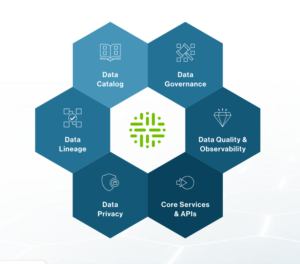

(Den Rise/Shutterstock)
If you’re in sales and marketing, you look to Salesforce for automation. If you manage IT assets, it’s ServiceNow. Human resources? That’s Workday. But what if data is the underlying asset? What platform do you turn to? It may not be Collibra in a landslide just yet, but executives at the data intelligence company make a compelling case that eventually it may be.
Collibra has come a long way from its 2008 founding, when co-founders Felix Van de Maele and Stijn Christiaens spun a project on collaborative semantics out of the STARLab at a university in Brussels, Belgium. The company’s first product was Data Governance Center, which used metadata to help customers track and govern their data assets.
For the next six years or so, the company advocated for data governance. Van de Maele and Christiaens sought to empower chief data officers and data stewards to have a greater role setting the rules behind data access during the early heydays of the big data boom.

Collibra Data Intelligence Cloud delivers a unified solution for data governance, lineage, discovery, catalging, quality, observability, privacy, and security.
Around 2014, Collibra added a data catalog to the mix. A data catalog was a natural fit with data governance, says Christiaens, the company’s chief data citizen. When somebody discovers a piece of data in a catalog, the first decision that needs to be made is whether he or she should be authorized to access it, which is data governance.
In 2016, faced with the new General Data Protection Regulation (GDPR) law, the company added data privacy and security, which would be called Collibra Protect. Finally, in early 2021, it added a data quality component with the acquisition of OwlDQ.
At some point along the way, it became apparent that data governance was no longer the headlining act. The company concluded that leading with data governance was actually a big turn-off to potential customers, Christiaens said.
“We found that governance had too much of a negative connotation: the data police,” Christiaens said last week at its Data Citizen ’22 conference, Collibra’s two-day user conference that attracted 1,000 attendees to San Diego. “In governance, you’re always going to be bucketed into that old, defensive data strategy that started the industry.”
The company that started out in firmly in the data governance camp searched for a new term that more accurately reflected the diversity of data capabilities that it offered and what it had become. The phrase “data intelligence” was born.
Data intelligence not only has a better ring to it than data governance, but it more accurately reflects the ultimate destination at the end of the big data tunnel that Collibra is trying to usher customers through, according to Christiaens.
“When you go in the elevator with the CEO and you start talking about data governance, their eyes glaze over,” Christiaens said. “But when you talk about data intelligence with them, and say hey, your competitors are doing better with data, how can we become more intelligent and connect the data to the value? You can have a whole other conversation.”
System of Data Engagement
That customers are struggling to get value out of their data and analytics investments is no secret. Study after study point to structural problems with data as a major impediment to becoming truly data-driven.

Collibra CEO Felix Van de Maele at Data Citizens 22 conference in San Diego Nov 3 (Image courtesy Collibra)
Data management is one issue, as customers continually seek new and better tools and techniques to rein in the typical sprawl of databases, file systems, and data lakes, with ETL/ELT pipelines connecting it all. Collibra’s goal is to sit one layer above the data management fray, providing a check on the messy digital chaos below with its SaaS, cloud-based offering.
“You have great databases and great tools,” said Van de Maele, who is Collibra’s CEO. “But what’s the system you’re going to use to bring all those teams together to say, hey if you’re a data analyst, business analyst, data engineer, analytics engineer, data steward, product steward–all those things–how are you actually going to automate those workflows and bring those people together to be productive? And that’s how we think of Collibra, to be the single system of engagement for the data function.”
The cloud giants increasingly are getting into the data management game, with an array of offerings for moving, storing, transforming, and analyzing data. They will also invariably offer data catalogs, which doesn’t concern Collibra too much. “Everyone and their dog is going to have a catalog,” Christiaens said.
But the hyperscalers’ catalogs won’t work with data residing in other hyperscalers’ data centers, which hurts the overall viability of having a single catalog for a customer’s entire data estate. That gives an opportunity for Collibra to become the Switzerland of data access and data intelligence.
“We believe that the future is in the cloud. We work with all the cloud players,” Christiaens said. “We also believe that our customers are going to be hybrid, that legacy on-prem isn’t going to go away over the next 10 years, and so we work with both. We take that Switzerland position, if you will, that says we’ll work with the future and we work with the past.”
Large and Growing Market
The New York-based company today has just north of 800 customers, including a good chunk of the Fortune 100, and it’s target market is the Global 2000. Larger customers with a strategic view of data are more apt to buy the entire suite of integrated tools, while smaller firms are more likely to buy one component of the suite.
In either case, the goal is the same: Give customers a single, metadata-driven platform for governing their complex data estates, and helping them be more strategic about data while boosting productivity and minimizing risk.
“That’s how we think about Collibra, as that single system of engagement, that single platform,” Van de Maele said “The core to all of that is, of course, metadata. That’s the essence. So that’s why we built out the data intelligence platform that combines governance, catalog, lineage, quality, observability, privacy and security.”
We’re very early into the data journey, Van de Maele says, but enough progress has been made to show that a new approach is needed for supporting modern data architectures running in the cloud. Collibra has thrown its hat into the data intelligence ring, and is taking a stand with its integrated, cloud-based suite of tools for governing and getting value out of data.
“If you’re really strategic about data, I don’t think there’s any difference between data and finance, IT, sales and marketing, and engineering,” he said. “You have to think of data as a function that you need to support, and every other function has a system to support that function. You have ServiceNow to run IT…You have Salesforce for sales and marketing. Workday to run HR. But you don’t really have something to run your data function.”
Well, Collibra, for one.
Related Items:
New Study Finds Data Intelligence Maturity Drives 3x Better Business Outcomes
Data Intelligence Focus Rewarding for Collibra
Collibra Announces $112.5 Million Funding Round, $2.3 Billion Valuation
July 3, 2025
- FutureHouse Launches AI Platform to Accelerate Scientific Discovery
- KIOXIA AiSAQ Software Advances AI RAG with New Version of Vector Search Library
- NIH Highlights AI and Advanced Computing in New Data Science Strategic Plan
- UChicago Data Science Alum Transforms Baseball Passion into Career with Seattle Mariners
July 2, 2025
- Bright Data Launches AI Suite to Power Real-Time Web Access for Autonomous Agents
- Gartner Finds 45% of Organizations with High AI Maturity Sustain AI Projects for at Least 3 Years
- UF Highlights Role of Academic Data in Overcoming AI’s Looming Data Shortage
July 1, 2025
- Nexdata Presents Real-World Scalable AI Training Data Solutions at CVPR 2025
- IBM and DBmaestro Expand Partnership to Deliver Enterprise-Grade Database DevOps and Observability
- John Snow Labs Debuts Martlet.ai to Advance Compliance and Efficiency in HCC Coding
- HighByte Releases Industrial MCP Server for Agentic AI
- Qlik Releases Trust Score for AI in Qlik Talend Cloud
- Dresner Advisory Publishes 2025 Wisdom of Crowds Enterprise Performance Management Market Study
- Precisely Accelerates Location-Aware AI with Model Context Protocol
- MongoDB Announces Commitment to Achieve FedRAMP High and Impact Level 5 Authorizations
June 30, 2025
- Campfire Raises $35 Million Series A Led by Accel to Build the Next-Generation AI-Driven ERP
- Intel Xeon 6 Slashes Power Consumption for Nokia Core Network Customers
- Equal Opportunity Ventures Leads Investment in Manta AI to Redefine the Future of Data Science
- Tracer Protect for ChatGPT to Combat Rising Enterprise Brand Threats from AI Chatbots
June 27, 2025
- Inside the Chargeback System That Made Harvard’s Storage Sustainable
- What Are Reasoning Models and Why You Should Care
- Databricks Takes Top Spot in Gartner DSML Platform Report
- LinkedIn Introduces Northguard, Its Replacement for Kafka
- Change to Apache Iceberg Could Streamline Queries, Open Data
- Agentic AI Orchestration Layer Should be Independent, Dataiku CEO Says
- Why Snowflake Bought Crunchy Data
- Fine-Tuning LLM Performance: How Knowledge Graphs Can Help Avoid Missteps
- Top-Down or Bottom-Up Data Model Design: Which is Best?
- The Evolution of Time-Series Models: AI Leading a New Forecasting Era
- More Features…
- Mathematica Helps Crack Zodiac Killer’s Code
- ‘The Relational Model Always Wins,’ RelationalAI CEO Says
- Confluent Says ‘Au Revoir’ to Zookeeper with Launch of Confluent Platform 8.0
- DuckLake Makes a Splash in the Lakehouse Stack – But Can It Break Through?
- Solidigm Celebrates World’s Largest SSD with ‘122 Day’
- The Top Five Data Labeling Firms According to Everest Group
- Supabase’s $200M Raise Signals Big Ambitions
- Toloka Expands Data Labeling Service
- With $17M in Funding, DataBahn Pushes AI Agents to Reinvent the Enterprise Data Pipeline
- Databricks Is Making a Long-Term Play to Fix AI’s Biggest Constraint
- More News In Brief…
- Astronomer Unveils New Capabilities in Astro to Streamline Enterprise Data Orchestration
- Databricks Unveils Databricks One: A New Way to Bring AI to Every Corner of the Business
- Seagate Unveils IronWolf Pro 24TB Hard Drive for SMBs and Enterprises
- Gartner Predicts 40% of Generative AI Solutions Will Be Multimodal By 2027
- BigBear.ai And Palantir Announce Strategic Partnership
- Astronomer Introduces Astro Observe to Provide Unified Full-Stack Data Orchestration and Observability
- Databricks Donates Declarative Pipelines to Apache Spark Open Source Project
- Deloitte Survey Finds AI Use and Tech Investments Top Priorities for Private Companies in 2024
- Code.org, in Partnership with Amazon, Launches New AI Curriculum for Grades 8-12
- Databricks Announces Data Intelligence Platform for Communications
- More This Just In…


























